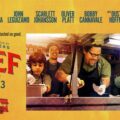Gordon Ramsay, Marco Pierre White, Anthony Bourdain, and Joe Bastianich are but some of the “celebrity chefs” rotating their presence on our TV screens right now.
They’ve changed the way we cook and have made chefs into rock stars at an international level.
Gordon Ramsay, probably the most “visible” amongst the lot – my 8-year-old, when asked to do a one-page biography of someone famous, chose him – has been the judge of Masterchef US for a few years now and has two restoration series wherein he travels to different parts of America helping people find their spark back in running restaurants and/or hotels.
Marco Pierre White is a guest judge on Masterchef Australia, and Joe Bastianich, till last season, was with Masterchef US, but as far as I know, he will be hosting the Italian version of the show from now on.
Anthony Bourdain is a well-known travel writer and TV personality roaming the world discovering foods and drinks and being totally badass about it.
If my education on food was to be wholesome – my plan as of now – I needed to know about the people who are responsible for the food revolution that has gripped the world over the last decade.
Ramsay and White are two chefs that are very much in the limelight all the time for one reason or another, primarily because of their food or else their controversial statements. Bourdain and Bastianich have a somewhat niche following, but all four of them have achieved superstardom – legendary status even – as chefs and restaurateurs in the case of Bastianich.
This is not to say there aren’t any more chefs or celebrities who are equally active professionally outside the kitchens as they are inside.
In fact, there are so many who have written biographies, cookbooks, and restaurant stories that the whole food genre in books has become extremely varied and complex, like the main course of any three-star Michelin restaurant.
As I write this, I still have a half-finished book about elBulli and Ferran Adria (and am on the verge of ordering his biography), but since it’s more about his apprentices and the restaurant, I decided to save it for later.
Padma Laxmi’s recent autobiography is on its way to me, and thus that too will be featured in the future. I’m also devouring the Penguin Great Food series (set of 20 books), which is proving to be a hard and expensive yet deliciously good find.
Coming back to autobiographies, I chose the four featured here because they are diverse in their own rights, and this is how;
Devil in the Kitchen and Humble Pie, the auto-biographies of Marco Pierre White and Gordon Ramsay, have to be read in succession. There’s way too much history between the two, and now the supposed animosity that it’s hard to separate one from the other.
On top of that, both cross-reference each other enough times that you’ll be left curious about the “other side of the story” if you read only one of the two books.
In Devil in the Kitchen, White takes us on a journey to how he became the youngest ever chef to conquer three Michelin stars. While he divulges his personal life in the process, the book’s primary focus is on his plight to Michelin stardom, his work, and his succession to the legendary status that he holds in the culinary world.
Similarly, Ramsay in Humble Pie writes exactly the way you’ve heard him speak during the numerous TV programs, in short, direct sentences which are to the point.
His book takes a much more personal approach where family takes precedence over his professional ambitions – one of them being to try and break Marco’s record of the youngest chef to get three Michelin stars.
He is open about his life, growing up with a father who wasn’t dependable, and details about his siblings that many would hide from the world.
Still, encompassing all the hardships, his focus remains on food, and it is clear that he is as cunning a businessman being able to tap into the zeitgeist of the time as he is a formidable cook who deserves all the success he has achieved.
Both books read well, and they give a never before seen insight into the workings of restaurants and kitchens. There are a lot of similarities between White and Ramsay, both of whom learned at the job, moving from one restaurant to another – Ramsay even did a stint on a private yacht – slowly rising up in the kitchen hierarchy purely on their culinary genius.
Then there’s the gossip, the backtalk, the revelations, and of course, the debauchery committed that every chef seems to be proud of and which is responsible in part for the reason why chefs are often compared to rock stars.

The kitchen culture that White and Ramsay talk about in their respective books happens to mirror restaurant life across the pond as well, and who better to give us a tour than Anthony Bourdain via his autobiography Kitchen Confidential which was quite controversial when it was initially released as it completely broke down the walls of the kitchens across the nation that till then has been hidden behind revolving doors.
In Kitchen Confidential (and I recommend picking up the new edition subtitled Insider’s Edition), Bourdain starts from the very beginning of his culinary journey to eventually become a TV host and gourmand.
Where his autobiography differs from that of White and Ramsay is that, unlike them, Bourdain took a different route in his professional life. After discovering his passion for food and doing odd jobs, he went to CIA (Culinary Institute of America), and afterward, instead of working his way up, learning techniques from well-established chefs, or going to Europe (especially France) to work in some of the best restaurants of the world, Bourdain went straight up the ladder to running restaurants in a short period of time, and eventually giving it all up and becoming more of a TV personality.
Bourdain’s book stands out because of his honesty about everything that happens in the heat of the kitchen and because of the importance he gives to every single person who is even remotely responsible for the food that is served.
His humbleness and his enormous experience are responsible for him becoming the authority on food that he is at present.
In the new edition, Bourdain looks back at his book and inks in a few pointers, which depicts how he has matured even further over the years into a much more admired figure internationally.
Ramsay, White, and Bourdain all talk about the hardships involved in learning to cook, the intensity of the job, the camaraderie that exists in the kitchen, and most importantly, the sacrifices one gives to become a chef.
Restaurant Man, on the other hand, is a completely different take on the business of food.
Instead of the kitchen, the reader, through Joe Bastianich, gets inside knowledge into owning and running a restaurant.
Joe is a restaurateur that hails from an immigrant family and has been in the business for decades. He is also the son of the famous chef Lidia Bastianich. Food has always been in his blood, but he tells us how he discovered his true calling after rebelling for a few years – which included working on Wall Street.
Raised in Queens, Bastianich left his job at Wall Street – and a six-figure salary – behind to rediscover his heritage in Italy. He then returned back to the US and started an empire along with Mario Batali.
At times his biography reads like a travelogue as Bastianich fondly remembers eating and drinking at different restaurants in towns and villages all across Italy. He is also a wine connoisseur, and reading his autobiography is equally a lesson on business as it is about living your passion.
Another aspect of Bastianich that is evident in his book is that he is extremely proud of his heritage and an ardent promoter of everything Italian.
Restaurant Man is frank about the business, the clients, the suppliers, about everyone who is part of the industry outside of the kitchen. The kind of brotherly love the chefs talk about between the kitchen staff, Joe displays for the front-of-the-house-staff, but he doesn’t hide away from the “evils” of the business – dealing with suppliers who are waiting to rip you off, pilferage by the staff, issues with landlords, etc.
Similar to Ramsay, White, and Bourdain, he doesn’t hold back on telling about the debauchery that goes hand in hand with the job – although not as detailed as the others.
He also almost seems proud of using the F-word ever so often. You’d think Ramsay was the king when it came to using the F-word- or maybe he is when it comes to TV – but read Joe’s biography, and you’ll reconsider that notion. No wonder both ended up on Masterchef together.
Here’s the thing though Joe knows about wine, and he’s implemented some brilliant ideas in his restaurants to make wine as important as the food. Now, I’m aware of how hard it is to get good wine in India (excluding Indian wine of course), and the laws are such that importing liquor is no easy task – trust me, I know – still, I hardly see any restaurant take up on these ideas – a fixed price for all wine bottles or serving Quartino. There’s a lot a restaurateur can learn from Restaurant Man.
These four chef biographies are full of anecdotes that are at times hard to believe, sometimes outright shocking, and at others, impressive to the very core, but each one of them is bound to leave an impression on not only those that want to be part of the food industry but anyone who watches TV and wonders what it takes to become a celebrity.










6 Comments
#TSBC
Reblogged this on The Sunday Book Club.